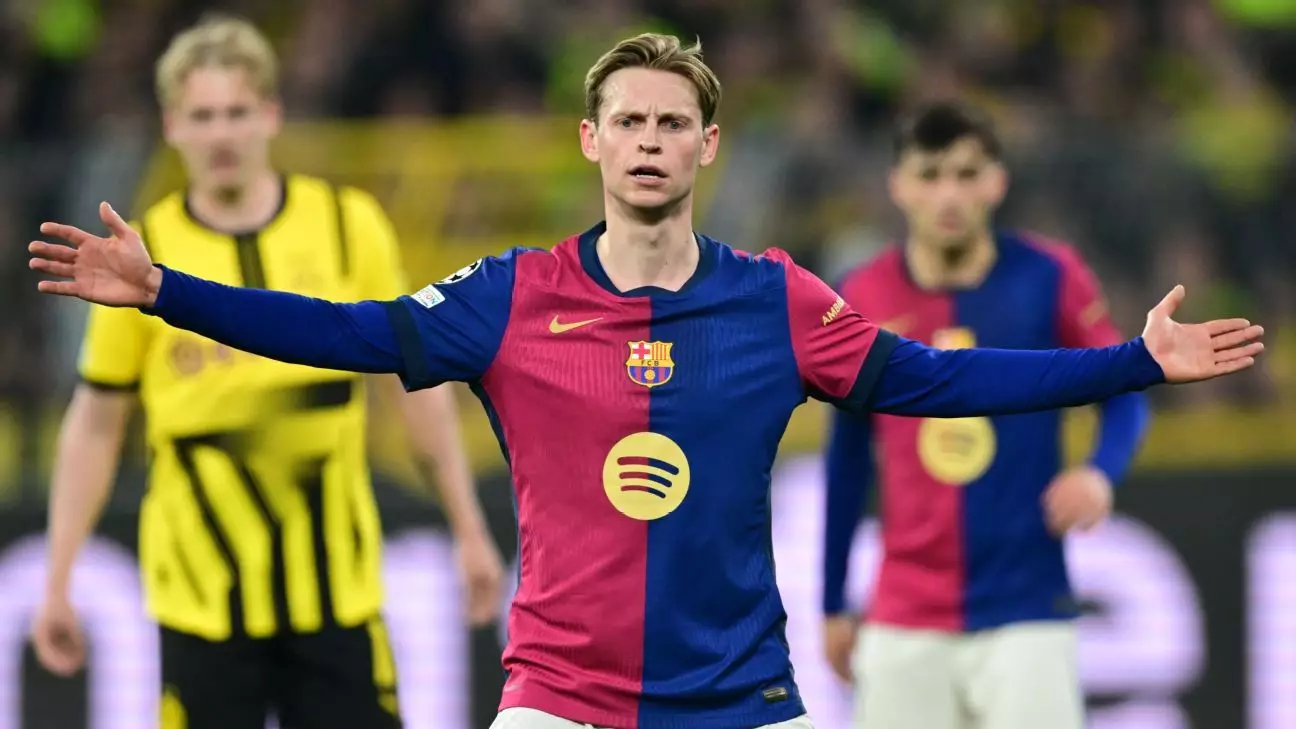In a season ripe with potential yet fraught with skepticism, FC Barcelona’s recent foray into the UEFA Champions League semifinals signifies more than just a ticket to the final four—it’s a testament to resilience amid adversity. Despite the undercurrent of disappointment following a 3-1 loss against Borussia Dortmund, the Catalonian giants have demonstrated an unwavering determination to reshape their narrative, which has been punctuated by recent European disappointments. This juxtaposition of elation and frustration captures the essence of Barcelona’s current trajectory: one where progress is underlying but complicated by lingering doubts.
As the dust settles on Dortmund’s Signal Iduna Park, we need to acknowledge that the match held more weight than merely a metric of victory and defeat. With Serhou Guirassy emerging as a standout performer with a hat-trick, Barca’s defensive lapses were exposed, illuminating vulnerabilities that have haunted them in high-stakes situations in the past. The psychological shadows of past capitulations against teams like AS Roma and Liverpool lurked in the minds of the players, raising questions about their mental fortitude moving forward.
The Weight of Expectations
Barcelona’s somewhat subdued post-match celebration, despite securing a place in the semifinals for the first time since 2019, starkly contrasts the exuberance one would typically associate with such a significant achievement. The players, while naturally pleased to advance, were palpably aware of the larger picture—the expectations surrounding them. Coach Hansi Flick poignantly noted the somber atmosphere in the dressing room following the match. The stark realization that they had underperformed even in victory is a reflection of the high stakes and inflated ambitions that now blanket this storied club.
This resurgence that Flick mentions has captured the attention and hearts of fans alike, yet it simultaneously amplifies the scrutiny that players face. After overcoming a trophy-less season prior, the stakes have been raised, and the team’s aspirations have evolved into a recognition of what is required to reclaim their status not only in Spain but across Europe. This transformation demands not only skill on the pitch but also a robust mental resolve in the face of burgeoning expectations.
The Challenge of Maintaining Momentum
With a reported 82 goals scored by the trio of Raphinha, Robert Lewandowski, and the promising Lamine Yamal, Barcelona’s attacking prowess has become one of Europe’s most formidable. However, that offensive capability was overshadowed during a turbulent match in Dortmund, starkly evidencing the interdependence of defense and attack. The absence of key players like Alejandro Balde brought to light the fragility of their squad depth. Barcelona had the advantage of a first-leg victory that seemed overwhelmingly secure. Yet, as the match unfolded, the tension rose, leading one to ponder—were they truly prepared for the rigors of this competition?
In the midst of the electrifying atmosphere provided by Dortmund’s notorious Yellow Wall, Barcelona’s initial missteps signaled an unsettling reality. Defensive errors paved the way for Guirassy’s success, leading to questions about the coherence of their defensive strategy under pressure. The reluctance to properly defend set pieces further highlighted an area ripe for improvement as they brace for the impending challenges of a Copa del Rey final against Real Madrid and potential clashes with Bayern Munich or Inter Milan.
Building Solid Foundations Amidst Uncertainty
Hansi Flick’s insistence on focusing on the positives—even amidst evident shortcomings—poignantly underscores a crucial dichotomy within the team. The ambition to strive for excellence amid adversity shows a broader trend within today’s football, where resilience becomes an essential currency. It’s not merely about individual talent or passing accuracy; it’s about translating those skills into meaningful results under dire conditions. This perspective of finding a balance between enjoyment and expectation is integral to Barcelona’s evolution.
This development phase can be likened to a double-edged sword where potential is plentiful, yet vulnerabilities persist. Players like Jules Koundé and Ronald Araújo must recognize that every misstep heightens scrutiny, burdening them under the enormous expectations of being part of a team striving for redemption on the grandest stages. Flick’s approach encourages a continued focus on self-improvement, a call to arms that reverberates through the ranks, urging players to not fall prey to complacency.
As the path ahead reveals a series of defining fixtures, Barcelona is tasked with transcending past errors to foster confidence. They have already showcased undeniable skill and promise, and with crucial matches approaching, the blend of learning from failures and building upon strengths will ultimately dictate if this evolution leads to lasting success on both domestic and European stages. The confluence of past struggles and present challenges adds texture to the fabric of what it means to be a Barcelona player today; only time will tell how they weave their story moving forward.


Leave a Reply